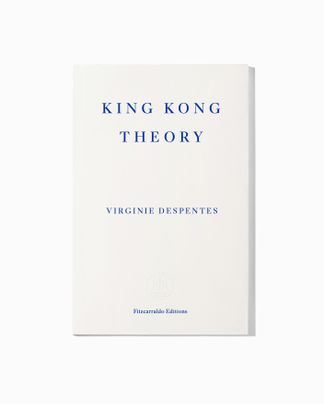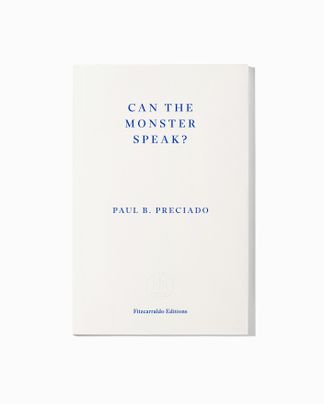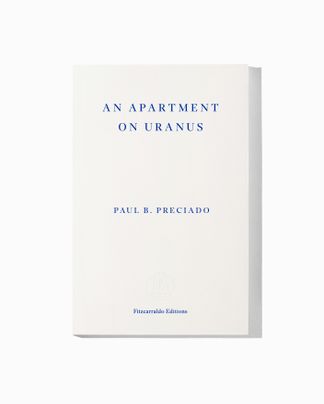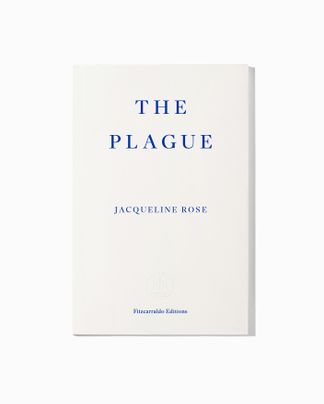In Dysphoria Mundi, Paul B. Preciado has written a mutant text assembled from essays, philosophy, poetry and autofiction that captures a moment of profound change and possibility. Rooted in the isolation of the Covid-19 pandemic, and taking account of the societal convulsions that have ensued, Preciado tries to make sense of our times from within the swirl of a revolutionary present moment. The central thesis of this monumental work is that dysphoria, to be understood properly, should not be seen as a mental illness but rather as the condition that defines our times. Dysphoria is an abyss that separates a patriarchal, colonial and capitalist order hurtling toward its end from a new way of being that, until now, has been seen as unproductive and abnormal but is in fact the way out of our current predicament. With echoes of visionaries such as William S. Burroughs and Kathy Acker, Preciado’s theoretical writing is propelled by lyric power while providing us with a critical toolbox full of new concepts that can guide our thinking and our actions: transition, cognitive emancipation, denormalization, disidentification, ‘electronic heroin’, digital coups, necro-kitsch. Dysphoria Mundi is Preciado’s most accessible and significant work to date, in which he makes sense of a world in ruins around us and maps a joyous, radical way forward.
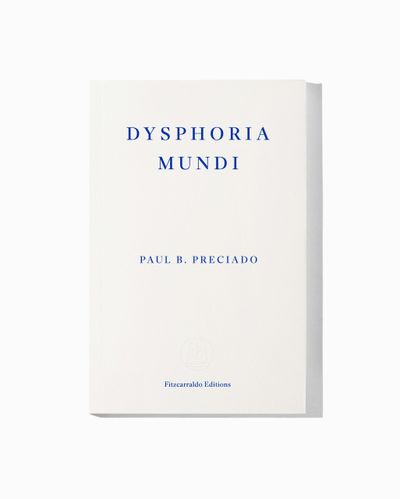
Dysphoria Mundi
French paperback with flaps, 498 pages
Published 27 March 2025
Dysphoria Mundi
0
I . DYSPHORIA MON AMOUR
PERSONAL MEDICAL HISTORY
The patient had meningococcal meningitis at the age of 18 months. Several symptomatic viruses (chicken-pox, measles, hepatitis X, EBV infection with prolonged fatigue). No personal or family allergies or autoimmune disease. Jaw surgery for genetic dislocation at age 18. As a result, he has a titanium jaw prosthesis. Cholecystectomy for lithiasis three years ago.
The patient is a writer, philosopher and teacher. He is active and travels a lot (conferences, exhibitions). He is a single trans-FtM and is treated with long-term testosterone hormone therapy, 200mg every 21-27 days.
He follows an ALD 31 protocol in France for an off-list condition (‘condition not listed but constituting a progressive or incapacitating form of a serious condition, requiring long-term care’) for gender dysphoria.
Diagnostic criteria and treatment plan:
Gender dysphoria since adolescence, living as male for several years, structured approach, multi-professional assessment and management: endocrinologist, psychiatrist, dermatologist, gynaecologist, surgeon, registered nurse, physical therapist, speech therapist.
Treatment: lifelong hormone replacement therapy (testosterone) and follow-up, post-op care, gynaecological follow-up, psychological follow-up and treatment.
Protocol valid until 29/11/2024.
I had to declare myself insane. Affected by a particular kind of insanity that they called dysphoria. I had to declare that my mind was at war with my body, that the mind was male and the body was female. Truth be told, I felt no distance between what they call the mind and what they identify as the body. I wanted to change, that’s all. And the desire for change did not differentiate between the mind and the body. I was insane, perhaps, but if that was the case my insanity consisted in refusing the antinomy between these two poles, the feminine and masculine, which for me had no other consistency than an always variable combination of chromosomal chains, hormone secretions, speech acts and linguistic interpellations. I was insane, perhaps, but if that was the case my form of insanity was as spiritual as it was organic. This dysphoria was the lover and master of my soul as much as of my cells. I was attracted to something else, to a gender that did not yet exist, to another mode of existence. There was a craving for this new gender that was as excessive as a summer rain falling to put out a fire. And the fire was that of history.
When I think about this insanity, if I don’t let myself get distracted by psychiatric diagnoses or by the pressure of state administrations, and I strive to capture the feeling that unquestionably dominates my days, it is of a rare political joy that I must speak first. Constructed over almost twenty years like an invisible tunnel under normative reality, this joy has ended up burrowing through an anthill. Today thousands of children affirm that they want to live as I wanted to live when I was considered insane. The following pages are an account of how, sometimes noisily, sometimes silently, this anthill was built and how the modern world that had separated our madness from their reason began to crumble.
—
We do not see or understand the world. Perceiving it through the narrow categories that inhabit us, we deny it and tear it apart. The pain we often feel in being alive is the result of this denial. The bioelectronic network constituting what was once called the human soul (it has gone by many names throughout history: psyche, mind, consciousness, unconscious; none of these names designate a reality, but rather an attempt to describe a process) consists partly in what has been considered until now as the body, but it is also partly dispersed through technologies and institutions. It is thus, by using architectures and cables, machines and algorithms, molecules and biochemical compositions for support, that our material soul manages to cross cities and oceans, moving away from the ground to the satellites that now surround the Earth. The living political body is as vast, as subtle and malleable as the soul. I am not speaking here of the body as an anatomical object or private property of the individual subject but of what I call, to differentiate it from the body as conceived by modern discourse, the ‘somatheque’.
The somatheque is the soul distributed through time and matter. Our vast, non-human soul, geological and cosmic, travels through the universe without us really being aware of it. In modern societies, the soul is first installed as a living implant in the flesh, and then, as it grows, it is sculpted like a bonsai tree, through repetitive training and punishment, through linguistic interpellations and institutional rituals, to reduce it to a certain identity. Some souls unfold more than others, but there are none in the garden of the living that are untouched by grafting and pruning. Some bodies seem to have existed for a long time without souls. They were understood to be pure anatomy, edible flesh, working muscles, reproductive wombs, skin to ejaculate into. Those bodies were, and still are, those they call animals, colonized, enslaved and racialized bodies, but also women, people considered sick or handicapped, children, homosexuals and people whose souls, according to nineteenth-century medicine, wanted to migrate into a body of a different sex. The bodies of migrating souls were first called ‘psychic transvestites’, then ‘transsexuals’, and later, ‘transgender’. After some time, they called themselves trans. Trapped in a binary epistemology (human/animal, soul/body, masculine/feminine, hetero/homo, normal/pathological, healthy/sick…), trans people have culturally constructed themselves as souls in exile and bodies in mutation.
I am, my contemporaries say, without agreeing with each other, either a sick soul or an erroneous body from which the soul seeks to escape. I am a split between the body that they impose on me and the soul that they fabricate, a cultural rift, a paradoxical category, a rupture in human natural history, an epistemic hole, a political breach, a religious conundrum, a business for psychologists, an anatomical eccentricity, a cabinet of curiosities, a cognitive dissonance, a museum of comparative teratology, a collection of misattributions, an attack on common sense, a media mine, a plastic surgery reconstruction project, an anthropological research terrain, a sociological battlefield, a case study about which governments and scientific organizations, churches and schools, psychiatrists and lawyers, medical associations and the pharma industry, fascists but also conservative feminists and socialists, Marxists and humanists, those new despots of the digital Enlightenment of the twenty-first century, always have something to say, without us having asked them anything whatsoever.
It is my vital condition as a mutant subject and my desire to live outside the normative prescriptions of the heteropatriarchal binary society that has been diagnosed as a clinical pathology referred to as ‘gender dysphoria’. I am just one of those beings who stubbornly refuse the political programme that has been implanted in them since childhood. Confronted with the arrogance of the disciplines and techniques of government that make this diagnosis, I attempt a philosophical zap: to displace and give new meanings to the medical notion of dysphoria in order to understand the contemporary global condition, the epistemological and political crack we are living through, and the tension between emancipatory forces and conservative resistances that characterize our present.
What if ‘gender dysphoria’ was not a mental disease but rather the political and aesthetic inadequacy of some forms of subjectivation in relation to the normative regime of sexual and gender difference? What if the contemporary planetary condition was the result of a generalized epistemic and political dysphoria?
Dysphoria mundi: the resistance of a great part of the living bodies of the planet to being subjected and dispossessed within a petrosexoracial regime of knowledge and power; the resistance of the planet to being objectified as a capitalist commodity.
With the notion of dysphoria mundi, I have no intention of fixing dysphoria as a natural entity, nor as a psychiatric condition that would allow us to describe the present. On the contrary: I seek to understand the states qualified as dysphoric not as psychiatric pathologies, but rather as forms of life that announce a new regime of knowledge and a new political and aesthetic order from which to think through the planetary transition. Modern disciplines such as normative psychology or psychiatry, which until now have managed and traded with psychic pain, must be displaced by collective experimental practices capable of working with epistemic and political pain.
The word ‘dysphoria’ is a late nineteenth-century medical invention constructed by hybridizing the Greek prefix ‘dys’, which removes, denies or indicates a difficulty, and the adjective phoros, derived from the verb pherein, to carry, transport, bear, transfer. We find the same verb in the word ‘metaphor’. But whereas metaphor carries something (meaning, significance, an image) from one place to another, dysphoria has difficulty carrying: it does not hold. If we were to express it in the language of material physics, we would say that the word ‘dysphoria’ designates a load problem, a difficulty or resistance, the impossibility of holding weight and carrying it. By analogy, for psychiatry, dysphoria indicates a mood disorder that makes daily life unbearable. As a clinical category, dysphoria re-emerged in the language of psychiatry in the twentieth century, replacing other ‘pathologies’ whose diagnosis and definition had become obsolete because of the lack of an institutional framework or because of poor rhetorical efficacy for understanding the conditions they were intended to name; but also because the old categories had been challenged by the ‘patients’ themselves as forms of oppression and cultural domination. Hysteria and melancholy are examples of the former; transsexuality of the latter. Hysteria and melancholia were replaced by dysphoria as a disorder characterized by unpleasant and sad emotions, anxiety, stress, dissociation, irritability or restlessness, self-directed violence, death wish and suicide attempts.
(…)
‘How lucky we are to have Paul Preciado as companion and interpreter of all we’ve just been through, with a global pandemic – luckier still is the gift of his revolutionary optimism, which runs through his thorough, gritty analysis of our current predicament. If you’re tired of ricocheting between neofascists and doomer dudes, here comes Dysphoria Mundi to recast our situation as “the most beautiful (or devastating) collective adventure we have ever embarked on,” and give us new strategies and inspiration to reconceptualize – and stay on – the ride.’
— Maggie Nelson, author of The Argonauts
‘An important dissident of dualism.’
— Amia Srinivasan, author of The Right to Sex
‘Paul Preciado’s singular genius is for writing vividly within the immediacy of everyday life, and then also unraveling from there the deeper historical forces that shape those moments. In Dysphoria Mundi we learn how the invisible traces of a virus thread bodies and societies together, lacing us into shifting regimes of power and commodification. Preciadio has that rare ability to lead the reader through familiar situations to unexpected conceptual insight. An essential thinker for the contemporary world.’
— McKenzie Wark, author of Reverse Cowgirl
‘Dysphoria, that profound unease of the soul, is revealed as the dominant emotion of our age, affecting the body, the planet and our relationships. Through philosophy and direct experience, Preciado radically expands our notion of power, from the force which oppresses us to the agency we possess in the service of our liberation.’
— James Bridle, author of Ways of Being
‘This monumental work brings the commitments of the bibliophile to bear on a time and a world now irreversibly out of joint. Drawing on theories of language, mind, technology, immunology to retell a story of this world, Preciado’s work more firmly shatters the binaries responsible for the destruction of love and futurity.’
— Judith Butler
‘The philosopher of the future.’
— El País
‘Preciado is a revolutionary of the twenty-first century.’
— Le Nouvel Observateur
Paul B. Preciado is the author of Can the Monster Speak?, An Apartment on Uranus, Counter-Sexual Manifesto and Testo Junkie, among other books, and wrote and directed the film Orlando, My Political Biography. He is the Director of the Institute for Planetary Transition at LUMA Arles, France. He was born in Spain and lives in France. Dysphoria Mundi is his third book to appear with Fitzcarraldo Editions.

